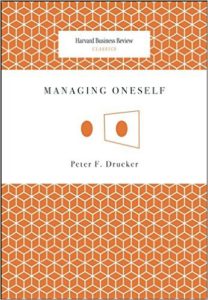This book will teach you how to become the CEO of your life.
There was a time when people didn’t have that many options. They just had to do what they were told or what the circumstances they lived in dictated, working on the field for example. Nowadays we live in a knowledge society, however, where there is a lot of variety, and everyone has to make his or her own decisions sooner or later, which is why we have to learn how to manage ourselves.
Find your strengths through feedback analysis
Most people don’t know what they really are good at. More often people know what they are not good at, but even then they are often wrong. So how can we know our strengths and weaknesses? Through feedback analysis.
Feedback analysis is the process of estimating an outcome and then comparing the results you are getting with what you estimated. Write down your expectations before you endeavor something, then analyze honestly how you performed.
This method of learning from the information you are getting will teach you in a short period where your strengths and weaknesses lie. Once you know what your strengths are, you have to concentrate on improving them.
Focus on improving your strengths
A good analysis will show where your gaps and strengths lie, if necessary close those gaps, but most importantly, work on improving your strengths. Your strengths are where you can generate the most impact. You don’t need to be good at everything to generate impact, one specific area is sufficient.
Overcome intellectual arrogance
People with great expertise in one area often are contemptuous of knowledge in other areas. [In the book Zero to One Peter Thiel mentions denying a job to a Ph.D. in Physics because of his arrogance in a job interview.] Bright people often think that being bright is a substitute for knowledge.
Taking pride in one’s area of expertise is self-defeating. Just because someone is a physicist, knowing the fundamental laws of our world, doesn’t mean that automatically know how the brain works.
Remedy bad habits
Your habits consist of the things you do. Success consists in a big part of good habits. To obtain good habits, you have to analyze the things you do and fail to do. Your feedback analysis will give you the necessary information with which you can make adjustments.
Find out how good you perform
Perhaps even more important than knowing what your strengths are is knowing how do you perform. Most people have no idea about their performance. Everyone works and performs differently. You have to find the way which works best for you.
Learn to learn
How do you learn best? Learning to learn faster will give you exponential benefits because once you learn at your fastest rate, you save a lot of time and can learn a lot more. Find out how you learn and then act on that knowledge. Not acting on your knowledge will condemn you to nonperformance.
Find your values
Every person has different values, so do organizations. If your values conflict with the values of the organization you work with, you will get frustrated, and your performance will be suboptimal. To thrive your work has to be aligned with your values. There is another description for values, purpose. Having a purpose and working in harmony with it will give you motivation and power.
Find the area you want to contribute
If you want to make the biggest possible impact, you should ask yourself the question, given my capabilities, where can I achieve results which will make the biggest impact within a reasonable timespan?
The answer should be stretching but within reach. In other words, you should be ambitious. The results should be measurable and meaningful to you.
Take responsibility for your relationships, communicate
Relationships are an important part of our lives, whether we work with other people or not. The first thing to accept is that other people are as much individuals as we are. They are unique and have their ways of getting things done. You should watch other people carefully and see what makes them effective. In your work, what matters is how your coworkers perform and what their values are. Understand that each person performs differently.
Take responsibility for your communication. In our time organizations consist of highly diverse specialists. So there is no way you can know what they do unless you ask them and they tell you. Ask what other people do, communicate effectively.
Whenever someone goes to his or her associates telling them “this is what I am good at, this is how I work, these are the values by which I live,” the response is always, “This is most helpful but why didn’t you tell me earlier?”
Communication is crucial.

